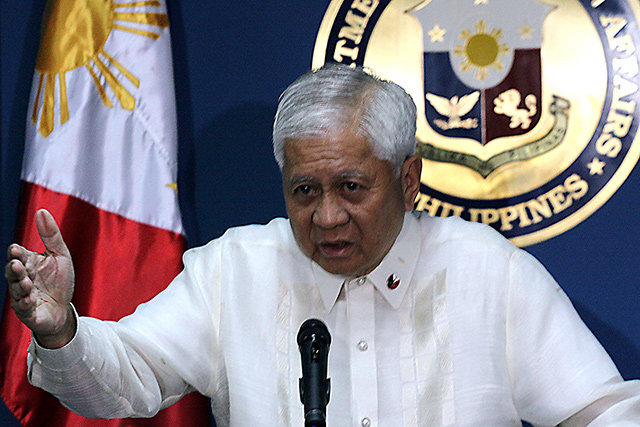
In June, Foreign Affairs Secretary Albert del Rosario called on victims of the alleged sex for repatriation scheme to come forward and help the government resolve the case. Danny Pata
The Department of Foreign Affairs grappled with crisis after crisis this year on the foreign policy frontlines—from the "Saudization" policy that confronted thousands of Filipino workers and other foreign nationals in oil-rich Saudi Arabia to armed hostilities in Sabah that threatened the country's cozy relations with Malaysia.
But the South China Sea territorial rifts were at the top of the high-stakes strategic concerns that tested and best defined the leadership of Foreign Secretary Albert Del Rosario.
Taking China to court
The Philippines took a bold gamble early this year when it brought China before The Hague-based Permanent Court of Arbitration over the West Philippine Sea dispute. In a region where many governments cringe at the prospect of standing up to Asia's resident superpower, it was a defining gambit in the country's foreign policy that earned the regional giant's ire but also the respect of many other nations.
Beijing ignored the move and made its displeasure felt by taking steps to prevent President Benigno Aquino III from attending an annual Association of South East Asian Nations-China trade expo in the Chinese city of Nanning in September despite quiet negotiations by Filipino diplomats with their Chinese counterparts.
"Foreign policy should continue to advocate, and to be based on, the rule of law," Del Rosario said in a speech early this month, pressing the country's rule-of-law approach that has become a buzzword in discussions of the territorial conflicts.
"Since the Philippines is not as economically strong and militarily powerful as other countries, the rule of international law will serve as the great equalizer," he added.
China's incursions, officials say, persisted in the South China Sea, some parts of which have been renamed West Philippine Sea by Manila.
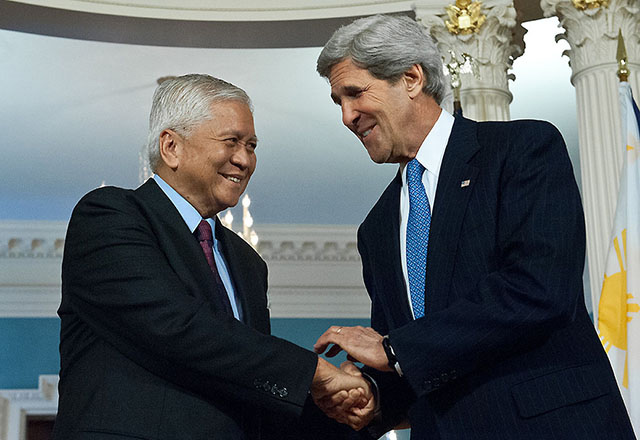
But the South China Sea territorial rifts were at the top of the high-stakes strategic concerns that tested and best defined the leadership of Foreign Secretary Albert Del Rosario.
Taking China to court
The Philippines took a bold gamble early this year when it brought China before The Hague-based Permanent Court of Arbitration over the West Philippine Sea dispute. In a region where many governments cringe at the prospect of standing up to Asia's resident superpower, it was a defining gambit in the country's foreign policy that earned the regional giant's ire but also the respect of many other nations.
Beijing ignored the move and made its displeasure felt by taking steps to prevent President Benigno Aquino III from attending an annual Association of South East Asian Nations-China trade expo in the Chinese city of Nanning in September despite quiet negotiations by Filipino diplomats with their Chinese counterparts.
"Foreign policy should continue to advocate, and to be based on, the rule of law," Del Rosario said in a speech early this month, pressing the country's rule-of-law approach that has become a buzzword in discussions of the territorial conflicts.
"Since the Philippines is not as economically strong and militarily powerful as other countries, the rule of international law will serve as the great equalizer," he added.
China's incursions, officials say, persisted in the South China Sea, some parts of which have been renamed West Philippine Sea by Manila.

Del Rosario met with US Secretary of State John Kerry in Washington in April. During their meeting, the United States expressed support for the Philippines' call for international arbitration in settling its territorial row with China in the West Philippine Sea (South China Sea). AFP/Nicholas Kamm
Kiram's men attack Sabah
In February, the DFA's attention turned to the south when Sulu Sultan Jamalul Kiram III deployed about 200 of his men, many of them armed, to Malaysian-controlled Sabah to press the clan's historical claim on the resource-rich territory, sparking weeks of deadly clashes with Malaysian forces.
The violence threatened to strain Manila's ties with Malaysia, which has been brokering the country's talks with the Moro Islamic Liberation Front. Calls for the government to revive a long-shelved claim to Sabah emerged.
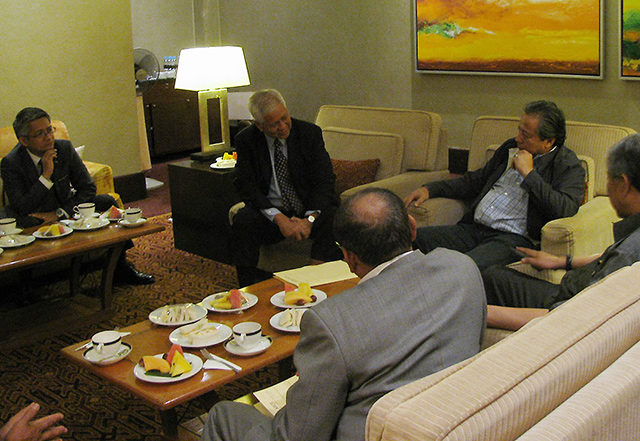
Foreign Affairs Sec. Albert del Rosario (2nd from left) traveled to Kuala Lumpur in early March to meet with Malaysian Foreign Minister Dato Sri' Anifah Aman (2nd from right) and Defense Minister Dato' Seri Dr. Ahmad Zamid Hamidi (right) on ways to peacefully resolve the Sabah crisis. At left is PHL Ambassador to Malaysia Ed Malaya. DFA
PHL-Taiwan relations sour over fisherman's death
In May, Taiwan protested and took retaliatory steps when one of its fishermen was shot and killed by Philippine Coast Guard personnel in northern waters. After months of tension, President Benigno S. Aquino III sent an envoy from the Manila Economic and Cultural Office to Taiwan in August to apologize on his behalf to the fisherman's family.
Sex-for-flight scheme uncovered
In June, chairman of the House committee on overseas workers' affairs Rep. Walden Bello announced that female overseas Filipino workers (OFWs) had come forward accusing some Philippine embassy and Labor officials in the Middle East of demanding sex in exchange for repatriation. In a "News To Go" interview the same month, Del Rosario said he had been unaware of reports about prostitution rings allegedly operated by Philippine embassy staffers. He later announced that the government probe into the incidents was expanded to include Hong Kong, Singapore and Malaysia.
The Department of Justice earlier this month created a task force to investigate the alleged sex-for-flight scheme.
Apology demanded for hostage crisis
Hong Kong continued to press its demand for an apology from the Philippine government for the death of eight Hong Kong tourists in a bungled hostage rescue in 2010.
In November, Del Rosario said that the Philippine and Hong Kong governments were "together working quietly to achieve a result that is mutually satisfactory."
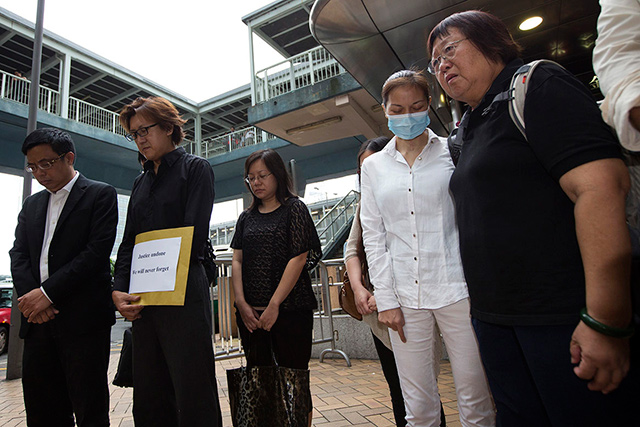
Survivors and relatives of several tourists who were killed during the August 23, 2010 Manila bus hostage crisis observe a moment of silence outside the Philippine Consulate in Hong Kong on the incident's 3rd anniversary. The group filed writs in the High Court in Hong Kong to seek compensation from the PHL after Manila allegedly ignored demands for compensation and declined to apologize. Reuters/Tyrone Siu
In May, Taiwan protested and took retaliatory steps when one of its fishermen was shot and killed by Philippine Coast Guard personnel in northern waters. After months of tension, President Benigno S. Aquino III sent an envoy from the Manila Economic and Cultural Office to Taiwan in August to apologize on his behalf to the fisherman's family.
Sex-for-flight scheme uncovered
In June, chairman of the House committee on overseas workers' affairs Rep. Walden Bello announced that female overseas Filipino workers (OFWs) had come forward accusing some Philippine embassy and Labor officials in the Middle East of demanding sex in exchange for repatriation. In a "News To Go" interview the same month, Del Rosario said he had been unaware of reports about prostitution rings allegedly operated by Philippine embassy staffers. He later announced that the government probe into the incidents was expanded to include Hong Kong, Singapore and Malaysia.
The Department of Justice earlier this month created a task force to investigate the alleged sex-for-flight scheme.
Apology demanded for hostage crisis
Hong Kong continued to press its demand for an apology from the Philippine government for the death of eight Hong Kong tourists in a bungled hostage rescue in 2010.
In November, Del Rosario said that the Philippine and Hong Kong governments were "together working quietly to achieve a result that is mutually satisfactory."

Survivors and relatives of several tourists who were killed during the August 23, 2010 Manila bus hostage crisis observe a moment of silence outside the Philippine Consulate in Hong Kong on the incident's 3rd anniversary. The group filed writs in the High Court in Hong Kong to seek compensation from the PHL after Manila allegedly ignored demands for compensation and declined to apologize. Reuters/Tyrone Siu
Repatriations from the Middle East
As crises overlapped at home, thousands of Filipinos got caught in the crossfires of the bloody unrest in Syria, Yemen and other Arab countries, prompting massive repatriations of Filipino workers and their dependents that the DFA helped oversee.
In Saudi Arabia, a government crackdown against illegal workers also prompted repatriations.
When UN peacekeepers from the Philippines were kidnapped in the Golan Heights, the DFA led a crucial probe and recommended that the Filipino contingent remain in the volatile region after UN officials acceded to Manila's demand for better security and deployment conditions.
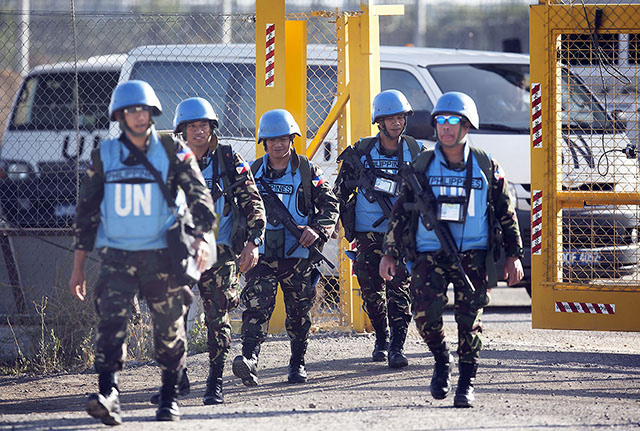
Filipino UN peacekeepers pass through an army crossing in Quneitra between Syria to the Israeli annexed Golan Heights on Wednesday, June 12. The DFA raised the issue of the peacekeepers' safety and security with the UN following two abduction incidents this year.AFP/Menahem Kahana
As crises overlapped at home, thousands of Filipinos got caught in the crossfires of the bloody unrest in Syria, Yemen and other Arab countries, prompting massive repatriations of Filipino workers and their dependents that the DFA helped oversee.
In Saudi Arabia, a government crackdown against illegal workers also prompted repatriations.
When UN peacekeepers from the Philippines were kidnapped in the Golan Heights, the DFA led a crucial probe and recommended that the Filipino contingent remain in the volatile region after UN officials acceded to Manila's demand for better security and deployment conditions.

Filipino UN peacekeepers pass through an army crossing in Quneitra between Syria to the Israeli annexed Golan Heights on Wednesday, June 12. The DFA raised the issue of the peacekeepers' safety and security with the UN following two abduction incidents this year.AFP/Menahem Kahana
Typhoon Yolanda
Yolanda's massive devastation kept the DFA busy as it helped issue an international appeal for aid, then coordinated the entry of assistance from more than 60 countries. The DFA oversaw the visits of US Secretary of State John Kerry, UN Secretary General Ban Ki-Moon and the ministers of Australia and United Kingdom to the typhoon-battered regions.
Agreements
With its weak military, the Philippines turned to diplomacy as a crucial weapon amid the territorial spats. That meant more spade work for the DFA.
The Philippines, Del Rosario said, has expanded defense and security engagements with more countries allied with the US, including South Korea, New Zealand, Italy, Spain and France. It has also enhanced ties with Japan to improve maritime security. Japanese Prime Minister Shinzo Abe visited the Philippines in July to boost ties between the two nations.
From 2012 to July of this year, the Philippines successfully oversaw the conclusion of more than 40 accords on political and security matters, Del Rosario said.
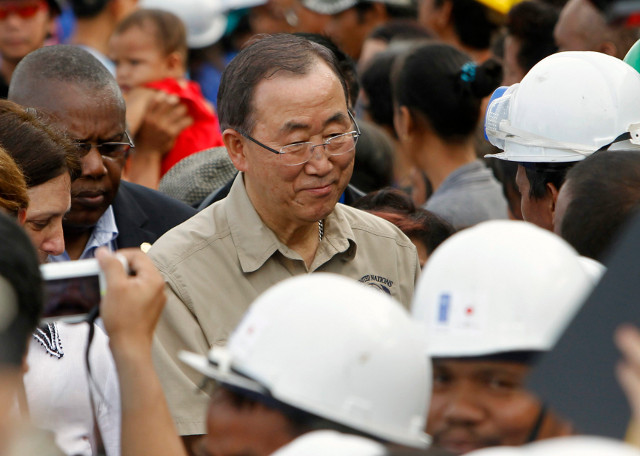
UN Secretary-General Ban Ki-moon is welcomed by a street sweeper after Ban inspected a devastated area in Fatima village, Tacloban City. Reuters/Romeo Ranoco
Yolanda's massive devastation kept the DFA busy as it helped issue an international appeal for aid, then coordinated the entry of assistance from more than 60 countries. The DFA oversaw the visits of US Secretary of State John Kerry, UN Secretary General Ban Ki-Moon and the ministers of Australia and United Kingdom to the typhoon-battered regions.
Agreements
With its weak military, the Philippines turned to diplomacy as a crucial weapon amid the territorial spats. That meant more spade work for the DFA.
The Philippines, Del Rosario said, has expanded defense and security engagements with more countries allied with the US, including South Korea, New Zealand, Italy, Spain and France. It has also enhanced ties with Japan to improve maritime security. Japanese Prime Minister Shinzo Abe visited the Philippines in July to boost ties between the two nations.
From 2012 to July of this year, the Philippines successfully oversaw the conclusion of more than 40 accords on political and security matters, Del Rosario said.

UN Secretary-General Ban Ki-moon is welcomed by a street sweeper after Ban inspected a devastated area in Fatima village, Tacloban City. Reuters/Romeo Ranoco
'Multi-dimensional' challenges
"It was another year of multi-dimensional challenges," Del Rosario said when asked how he assessed 2013.
Those challenges, he said, concerned major issues "encompassing the promotion of our national security, the advancement of our economic diplomacy and the protection of the welfare of our overseas Filipinos."
"We faithfully implemented a principled foreign policy as directed by our president," he said.
"It was another year of multi-dimensional challenges," Del Rosario said when asked how he assessed 2013.
Those challenges, he said, concerned major issues "encompassing the promotion of our national security, the advancement of our economic diplomacy and the protection of the welfare of our overseas Filipinos."
"We faithfully implemented a principled foreign policy as directed by our president," he said.

No comments:
Post a Comment
Note: Only a member of this blog may post a comment.